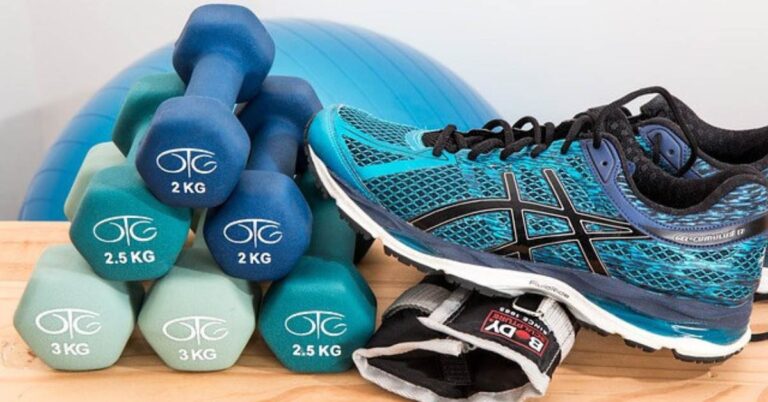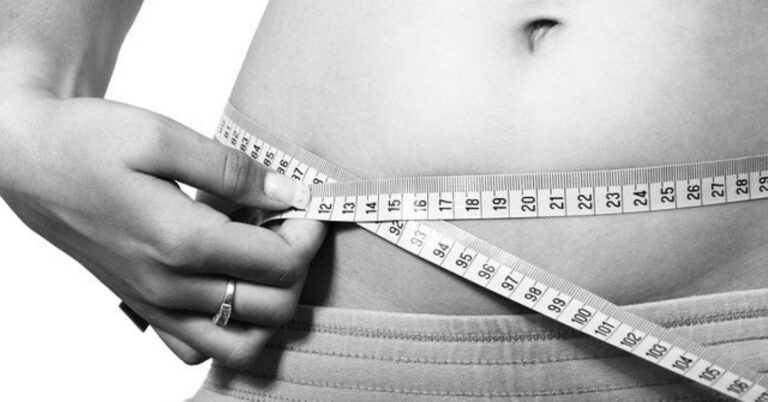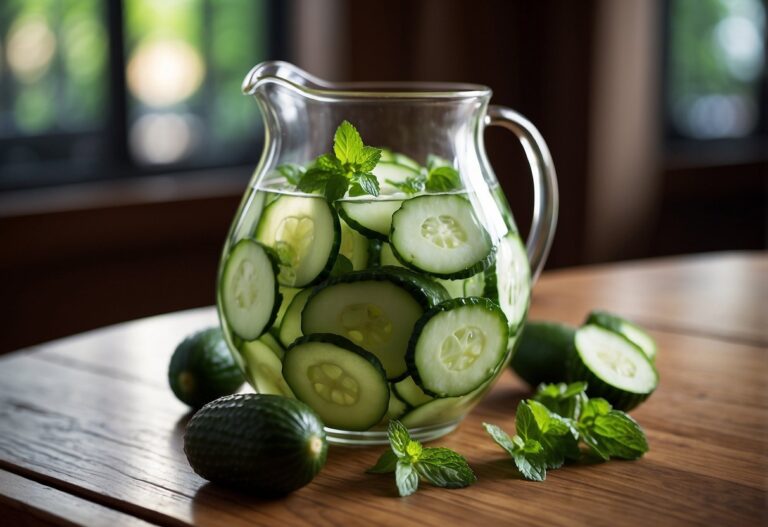So you’re taking creatine to get ripped eh? Well, I’m guessing you know about the importance of drinking extra water too? But how much water should you actually drink with creatine?
It’s a fairly common question for those new to creatine use, and for good reason – proper hydration is crucial to experiencing the benefits of creatine while avoiding potential side effects.
In this in-depth guide, we’ll explore the science behind creatine and hydration. You’ll learn how to determine your ideal creatine dosage, calculate your water needs while supplementing, and balance creatine intake with the right amount of water. We’ll also provide tips for staying hydrated, discuss the side effects of creatine dehydration, and highlight the performance and muscle-building benefits creatine offers when used properly.
When taking the recommended daily 5g of creatine, you should drink 3-4 litres of water per day. For every 1g above the recommended 5g, (for example, when creatine loading), you should increase your water intake by 100ml. There are no hard and fast rules around how much water you should use to dissolve creatine, however, larger volumes will allow it to dissolve easier. Hot water makes dissolving creatine easier but cold water will take longer but is no less effective.
What is Creatine?
Creatine is one of the most well-researched sports supplements on the market. It’s a naturally occurring compound that’s primarily found in animal foods like beef, poultry, and fish.
Inside your body, creatine acts as an energy reservoir for cells – especially muscle cells. It helps supply them with extra ATP, which is the key energy source for powering muscle contractions during high-intensity exercises like lifting weights or sprints.
Supplementing with creatine monohydrate powder can increase stores of it within your muscles. This provides your cells with more energy to push out those extra reps when strength training.
The Science Behind Creatine: How it Works
Here’s a quick look at the science behind how creatine supplements boost your performance:
- Increased creatine stores in your muscles help produce more ATP energy when you need quick bursts of power.
- Higher ATP levels in muscle cells boost your strength output, power, and endurance – especially for explosive high-intensity exercises like weight lifting or sprints.
- Combining creatine supplementation with resistance training can lead to greater muscle growth compared to training alone.
- Creatine directly draws more water into your muscle cells. This is what causes the increase in weight many experience when starting it, mostly due to water moving into your muscles.
Figuring Out Your Creatine Dosage: How Much is Enough?
To maximise the performance-enhancing effects of creatine while minimising side effects, you need to take an optimal dose tailored to your goals. Consuming more than you need won’t provide added benefits but could lead to greater water retention.
Here are some general creatine dosage guidelines based on your objectives:
If your goal is to…
- Increase power output for athletic performance: Take 3-5 grams per day
- Boost strength and muscle mass gains from training: Take 5-10 grams per day
- Add muscle mass rapidly (loading phase): Take 20 grams per day for 5-7 days
- Maintain muscle mass (post-loading): Take 2-5 grams per day
The standard protocol is to take your daily creatine dose in 4-5 gram amounts split before and after your workout. However, some people take their entire dose post-workout. Personally, I take creatine mixed with a protein shake at any point during the day.
Experiment to find the timing and amount that works best for your goals. Just be sure to increase your water intake appropriately for the dosage you settle on.
Now let’s explore a protocol designed to rapidly saturate your muscles with creatine and water.
An Introduction to Creatine Loading
Many people choose to do a creatine “loading phase” when they first start supplementing it. This strategy quickly supersaturates your muscles with creatine.
Loading involves taking very high doses of 20-25 grams per day for 5-7 days to rapidly maximise muscular creatine levels. This is followed by a lower 2-5 gram daily maintenance dose.
Loading can cause you to gain even more weight during the initial 1-2 weeks due to faster water retention. Just be aware of this rapid increase and stick with the protocol to push past it.
Now let’s explore why creatine makes you need more water in the first place.
Why You Need Water with Creatine
To understand how much water you should drink with creatine, you first need to grasp the crucial scientific link between creatine and water.
Determining Your Water Intake: How Much is Required When Consuming Creatine?
Creatine relies heavily on water to exert its performance-enhancing effects. When creatine gets stored in your muscles, it binds to water molecules.
This creatine-water complex creates an osmotic pressure that pulls more fluid into muscle cells. The more creatine you have, the greater the fluid retention in your muscles.
All this extra water flooding into your muscles can lead to dehydration if you don’t increase your water intake.
Without drinking more, the increased muscular demand for water caused by creatine can drain water from other areas of your body. This disturbance of your body’s water balance can leave you dehydrated.
To keep your body’s fluid levels optimally balanced when taking creatine, increased water consumption is key.
The pulling in of water by creatine does lead to significant water weight gain. This usually peaks within the first 1-2 weeks of supplementation as your muscles become super-hydrated.
But this added water weight from creatine is not meaningless bloat as some assume. It actually serves a useful purpose for building muscle.
That water rushing into your muscles from creatine has benefits beyond just added weight on the scale:
- Increased cell volume places a stretch on muscle cell membranes. This stimulates anabolism and muscle growth.
- Greater muscular hydration boosts protein synthesis rates to aid muscle recovery and growth.
- Water retention helps stabilise your muscle cells. This reduces damage during training and aids repair.
As you can see, proper water intake is critical to harnessing the full power of creatine for building muscle and strength.
The Impact of Creatine on Water Weight Gain
A common experience when starting creatine is rapid weight gain in the first 1-2 weeks. You may gain anywhere from 2-6 pounds.
This sudden spike on the scale is mostly from water weight, not actual muscle mass. The influx of water into your muscles causes them to swell and bodyweight to increase.
But keep in mind that this initial water weight gain is normal and levels off as your body adjusts to storing higher creatine levels. Any subsequent weight gain is likely from enhanced muscle growth with training, not just water retention.
Now that you understand creatine’s effects on water balance, let’s get the point…
How Much Water Should You Consume with Creatine?
Determining optimal water intake on creatine is not an exact science. But here are some research-backed guidelines for staying hydrated:
- Increase daily water intake by 500ml for every 5 grams of creatine taken.
- When loading with 20+ grams per day, drink at least 1-2 extra liters of water daily.
- During workouts, drink 250-500mlof water for every 30 minutes of exercise to replace fluids lost by sweating.
- Weigh yourself regularly and drink more water if weight drops, indicating fluid loss.
- Drink extra water when sweating heavily or in hot/humid environments.
- If urine becomes dark, increase water intake. Light, frequent urination means you’re hydrated.
Stick within these general guidelines for keeping your body’s water levels balanced when supplementing with creatine.
Now let’s explore some of the side effects that can occur if you don’t hydrate properly while taking it.
How To Avoid Retaining Water Weight On Creatine
Creatine’s Side Effects: Does it Lead to Water Retention?
Creatine does commonly cause some initial water retention and bloating when you first start supplementing it. This is due to the rapid influx of water into your muscles.
Other possible side effects of creatine include:
- Weight gain (primarily from water retention)
- Muscle cramps
- Stomach discomfort
- Diarrhea
- Headaches
These side effects are most likely to occur if you take too much creatine without drinking enough water. Proper hydration can help minimise adverse effects.
However, high doses aren’t required to reap benefits. Stick within the recommended dose ranges and ramp up water intake, and you’re unlikely to experience issues.
Creatine and Caffeine: Why They Might Not Mix Well
Many pre-workout supplements contain both creatine and caffeine. But is combining these two ingredients actually beneficial or even safe?
Here’s what you should know about supplementing creatine and caffeine together:
- Caffeine is a diuretic that can dehydrate you. This works against creatine’s fluid retention effects.
- Stacking creatine with caffeine may impair strength and weight gain benefits.
- Too much caffeine can overstimulate your nervous system when combined with creatine’s energy boost.
That said, small doses of caffeine equivalent to 1-2 cups of coffee are unlikely to cause issues. But avoid taking high amounts of caffeine from pre-workout supplements to play it safe.
See also:
For more information on creatine and other supplements, see this article
Strategies for Staying Well Hydrated
Here are some key strategies for maintaining optimal hydration levels while supplementing creatine:
- Sip water consistently – don’t just gulp a large amount at once.
- Drink at least 250-500ml of water 30 minutes before your workout.
- Consume another 250-500ml during your workout every 15-30 minutes.
- Weigh yourself regularly to ensure you aren’t losing water weight.
- Add electrolytes to your water from powdered blends or fresh lemon/lime.
- Limit caffeinated drinks like coffee and soda which can dehydrate you.
- Eat your water too! Focus on fruits and veggies with high water content.
Proper planning and discipline with your hydration strategy is key to avoiding the risks of dehydration while benefiting from creatine.
Summary of Key Points
Here’s a quick recap of some of the most crucial points on creatine and hydration:
- Take 3-10 grams of creatine per day, ideally splitting your dose before and after workouts.
- Increase water intake by 500ml for every 5 grams of supplemental creatine daily.
- Creatine pulls water into muscle cells. Drink enough water daily to avoid dehydration.
- Weigh yourself regularly and drink more water if losing weight, indicating fluid loss.
- Dehydration from creatine can cause cramping, reduced performance, and muscle tears.
- When used properly with ample hydration, creatine provides significant performance and muscle growth benefits.
The bottom line: creatine can work wonders, as long as you put in the work to stay hydrated! Employ these strategies to maximise your results.







